Filter by

Optimization Methods for Gas and Power Markets
As power and gas markets are becoming more and more mature and globally competitive, the importance of reaching maximum potential economic efficiency is fundamental in all the sectors of the value chain, from investments selection to asset optimization, trading and sales. Optimization techniques can be used in many different fields of the energy industry, in order to reduce production and finan…
- Edition
- 1
- ISBN/ISSN
- 978-1-137-41296-6
- Collation
- XVII, 192
- Series Title
- Applied Quantitative Finance
- Call Number
- -

Behavioral Interactions, Markets, and Economic Dynamics : Topics in Behaviora…
This book collects important contributions in behavioral economics and related topics, mainly by Japanese researchers, to provide new perspectives for the future development of economics and behavioral economics. The volume focuses especially on economic studies that examine interactions of multiple agents and/or market phenomena by using behavioral economics models. Reflecting the diverse fiel…
- Edition
- -
- ISBN/ISSN
- 978-4-431-55501-8
- Collation
- XVIII, 669
- Series Title
- -
- Call Number
- 332
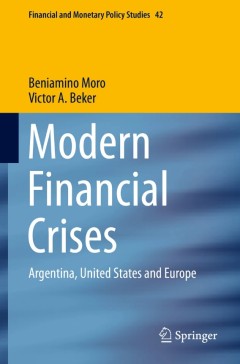
Modern Financial Crises
This book is devoted to the analysis of the three main financial crises that have marked this century: 2001 Argentina’s defaulting on its external debt, the American subprime crisis in 2008, and the current European debt crisis in Europe. The book pursues three major objectives: firstly, to accurately portray these three financial crises; secondly, to analyze what went wrong with mainstream e…
- Edition
- 1
- ISBN/ISSN
- 978-3-319-20990-6
- Collation
- XVII, 257
- Series Title
- Financial and Monetary Policy Studies
- Call Number
- -

Evolution of the Exchange Industry From Dealers’ Clubs to Multinational Co…
This book describes the dramatic changes that have occurred in the exchange industry during the past two decades. The strategies adopted by major world exchanges during this period are explained and the roles of multilateral trading systems and over-the-counter (OTC) players are clearly described, highlighting their economics and their interconnections with traditional exchanges. Up-to-date, co…
- Edition
- -
- ISBN/ISSN
- 978-3-319-21027-8
- Collation
- 3 b/w illustrations, 40 illustrations in colour
- Series Title
- -
- Call Number
- -
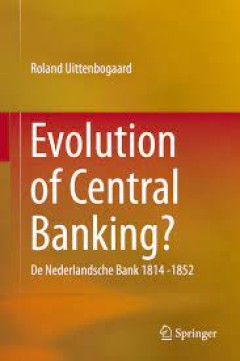
Evolution of Central Banking? De Nederlandsche Bank 1814 -1852
The book analyses the establishment of De Nederlandsche Bank and its early development as a case study to test competing theories on the historical development of central banking. It is shown that the establishment of DNB can be explained by both the fiscal theory and the financial stability theory. Later development makes clear that the financial stability role of DNB prevailed. DNB´s bank no…
- Edition
- -
- ISBN/ISSN
- 978-3-319-10617-5
- Collation
- 14 illustrations in colour
- Series Title
- -
- Call Number
- -
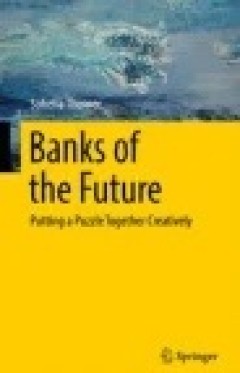
Banks of the Future : Putting a Puzzle Together Creatively
This book will guide financial institutions in developing new approaches and solutions for handling perennial issues. Emphasizing the value of creativity for project management in the banking sector, the author provides new insights for all those working in banking and finance. Presenting a number of new, outside-the-box ideas, the book can be regarded as the missing spice that will creatively …
- Edition
- -
- ISBN/ISSN
- 978-3-319-07554-9
- Collation
- XXIII, 229
- Series Title
- -
- Call Number
- 332

Banking Crises : Perspectives from the New Palgrave Dictionary of Economics
Why do banks collapse? Are financial systems more fragile in recent decades? Can policies to fix the banking system do more harm than good? What's the history of banking crises? With dozens of brief, non-technical articles by economists and other researchers, Banking Crises offers answers from diverse scholarly viewpoints.
- Edition
- -
- ISBN/ISSN
- 978-1-137-55379-9
- Collation
- XIV, 350
- Series Title
- -
- Call Number
- 332
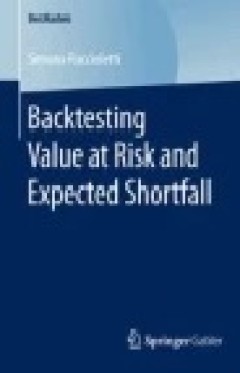
Backtesting Value at Risk and Expected Shortfall
In this book Simona Roccioletti reviews several valuable studies about risk measures and their properties; in particular she studies the new (and heavily discussed) property of "Elicitability" of a risk measure. More important, she investigates the issue related to the backtesting of Expected Shortfall. The main contribution of the work is the application of "Test 1" and "Test 2" developed by A…
- Edition
- -
- ISBN/ISSN
- 978-3-658-11908-9
- Collation
- XIX, 145
- Series Title
- -
- Call Number
- 332

Evaluation and Decision Models with Multiple Criteria Case Studies
This book showcases a large variety of multiple criteria decision applications (MCDAs), presenting them in a coherent framework provided by the methodology chapters and the comments accompanying each case study. The chapters describing MCDAs invite the reader to experiment with MCDA methods and perhaps develop new variants using data from these case studies or other cases they encounter, equipp…
- Edition
- -
- ISBN/ISSN
- 978-3-662-46816-6
- Collation
- 67 b/w illustrations, 72 illustrations in colour
- Series Title
- -
- Call Number
- -
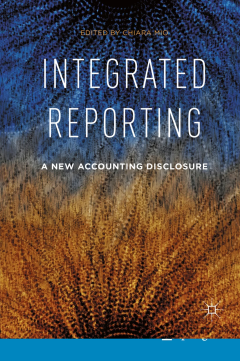
Integrated Reporting
This book is a timely addition to the fast-growing international debate on Integrated Reporting, which offers a holistic view of the evolution and practice of Integrated Reporting. The book covers the determinants and consequences of Integrated Reporting, as well as examining some of the most relevant issues (particularly in the context of the United States) in the debate about Integrated Repor…
- Edition
- -
- ISBN/ISSN
- 978-1-137-55148-1
- Collation
- XXVIII, 312
- Series Title
- -
- Call Number
- 330 INT
 Computer Science, Information & General Works
Computer Science, Information & General Works  Philosophy & Psychology
Philosophy & Psychology  Religion
Religion  Social Sciences
Social Sciences  Language
Language  Pure Science
Pure Science  Applied Sciences
Applied Sciences  Art & Recreation
Art & Recreation  Literature
Literature  History & Geography
History & Geography